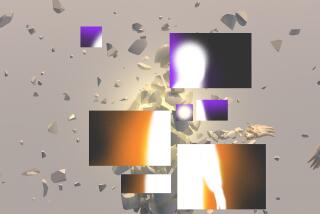What you learn when love is taken away
For the past seven years, I have taught a writing class at Central Juvenile Hall, an unlikely setting to be thinking about this Valentineâs Day, which arrives in great probability on the eve of war, even as the dust of the Columbia seems still to rain down upon us.
The day the Columbia fell, I asked the boys what they had in common with the astronauts who had perished. Said one: âThey were exploring outer space, the same way weâre searching inside ourselves.â
âSearchingâ was the word I had hoped to hear. Itâs the word I always hope to hear when Iâm with the boys, who are housed at Central as they await disposition of their cases. Some will end up in adult prison or the California Youth Authority or camp or foster placement. In rare cases, they will go home. Regardless of where they are bound, at the moment they are in my class, their futures are in doubt. They are scared and they are searching, so we talk and write about childhood and life. And one of the most telling exercises involves a discussion of what might be required for them to change their lives.
I begin with a series of questions. I ask, for instance, if guns were taken away from them, would it change their lives?
No, most of them say, they would only feel vulnerable and seek more guns.
What if drugs were taken away?
No, they repeat. They could always find more drugs if they wanted them.
Then I ask them this: Would it change their lives if they could return home to families in which fathers and mothers and brothers and sisters and aunts and uncles and cousins and grandparents and cats and dogs and whoever else played viable, loving roles in one anotherâs lives?
If their homes were lees, filled with love, would it change them?
Every student I have ever asked has answered, without hesitation, that, yes, that would change his life. In doing so, they tell me that what they seek more than anything is love.
The boys have taught me that love is more than fuzzy feelings, poetry, kerygma or benevolence, that it is vital and addresses complex issues of juvenile crime and social injustice. They have taught me how love strengthens us as individuals and families, communities and nations, and it is strength we need this Valentineâs Day.
Much of the boysâ writing addresses their feelings about the lack of love in their lives. In a piece titled âStranded,â one student wrote:
Once upon a time,
I guess I had a mind
That used to cry.
But no tears formed
In my eyes.
Didnât even care
If I lived or died.
No luv around,
Didnât even ask why.
Just blurred mind.
Smokinâ sherm.
So young, not knowinâ
What life I wanna form.
No school, no education.
Nobody grown who an inspiration.
Broke, so drug money
Iâm makinâ.
Sittinâ. Stranded
In the Mojave.
Another wrote this, titled âLonelyâ:
What loneliness is to me
Is when you are alone,
And you kind of find out
How you really is inside.
And how you feel loneliness is
Something that hurts.
Because you feel like
You donât have no one.
Really you donât.
And you start to cry,
But that donât help.
And you think,
How could you escape it?
But really thereâs no way to escape it.
You have to live with it,
Because it is a part of you.
When I feel lonely,
I feel lost.
Because there is
Nothing there
For me.
Some of the boys are from homes filled with love, but they still get swept up in the momentum of the streets. It isnât until they get locked up, get time and get sent away that they understand the importance of their families and, in some cases, the damage their actions does to other families.
Sometimes I think I can see my life through their eyes. And I suspect they would tell me -- just as those who lost loved ones on the Columbia or those with family members in the Persian Gulf would say this Valentineâs Day -- that it would be foolish not to honor and celebrate, every moment of every day, the love in our lives.
*
Duane Noriyuki can be contacted by e-mail at [email protected].
More to Read
Sign up for Essential California
The most important California stories and recommendations in your inbox every morning.
You may occasionally receive promotional content from the Los Angeles Times.










